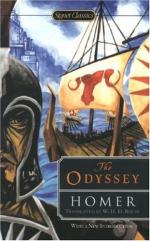Immediately afterwards Ulysses came inside, looking like a poor miserable old beggar, leaning on his staff and with his clothes all in rags. He sat down upon the threshold of ash-wood just inside the doors leading from the outer to the inner court, and against a bearing-post of cypress-wood which the carpenter had skilfully planed, and had made to join truly with rule and line. Telemachus took a whole loaf from the bread-basket, with as much meat as he could hold in his two hands, and said to Eumaeus, “Take this to the stranger, and tell him to go the round of the suitors, and beg from them; a beggar must not be shamefaced.”
So Eumaeus went up to him and said, “Stranger, Telemachus sends you this, and says you are to go the round of the suitors begging, for beggars must not be shamefaced.”
Ulysses answered, “May King Jove grant all happiness to Telemachus, and fulfil the desire of his heart.”
Then with both hands he took what Telemachus had sent him, and laid it on the dirty old wallet at his feet. He went on eating it while the bard was singing, and had just finished his dinner as he left off. The suitors applauded the bard, whereon Minerva went up to Ulysses and prompted him to beg pieces of bread from each one of the suitors, that he might see what kind of people they were, and tell the good from the bad; but come what might she was not going to save a single one of them. Ulysses, therefore, went on his round, going from left to right, and stretched out his hands to beg as though he were a real beggar. Some of them pitied him, and were curious about him, asking one another who he was and where he came from; whereon the goatherd Melanthius said, “Suitors of my noble mistress, I can tell you something about him, for I have seen him before. The swineherd brought him here, but I know nothing about the man himself, nor where he comes from.”
On this Antinous began to abuse the swineherd. “You precious idiot,” he cried, “what have you brought this man to town for? Have we not tramps and beggars enough already to pester us as we sit at meat? Do you think it a small thing that such people gather here to waste your master’s property—and must you needs bring this man as well?”
And Eumaeus answered, “Antinous, your birth is good but your words evil. It was no doing of mine that he came here. Who is likely to invite a stranger from a foreign country, unless it be one of those who can do public service as a seer, a healer of hurts, a carpenter, or a bard who can charm us with his singing? Such men are welcome all the world over, but no one is likely to ask a beggar who will only worry him. You are always harder on Ulysses’ servants than any of the other suitors are, and above all on me, but I do not care so long as Telemachus and Penelope are alive and here.”
But Telemachus said, “Hush, do not answer him; Antinous has the bitterest tongue of all the suitors, and he makes the others worse.”




